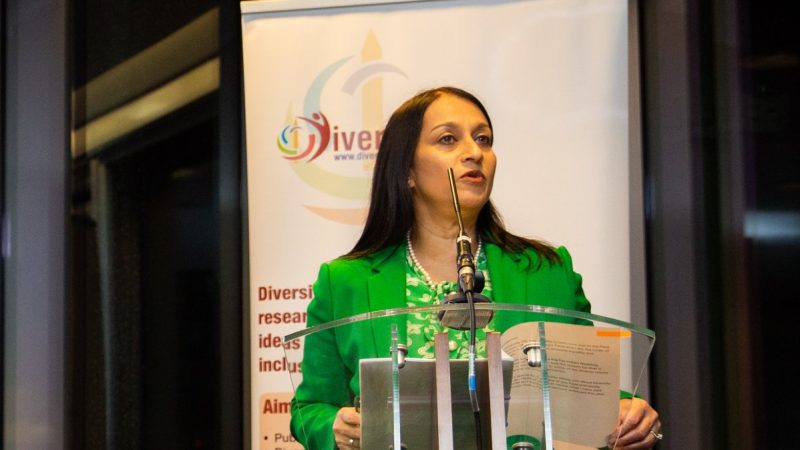Legal Diversity League Table 2014
Last night (29th October 2014) saw the release of the Black Solicitors Network (BSN) Diversity League Table 2014 report ranking legal firms in the UK on policy and practice, demographics and a range of other diversity criteria. Matthew Arnold & Baldwin topped the leagure table overall as they did in 2013. O'Melveny & Myers LLP were second, repeating their No 2 ranking again and Weightmans LLP entered the top 10 in the third spot. Laura Seaman, Corporate Responsibility Partner at Matthew Arnold & Baldwin said, “Diversity is a core value of ours. We want the best people so must attract and retain people from a wide range of backgrounds and experiences.” Withers came top of the ranking for Female Partners, followed by Slater and Gordon (UK) and Winckworth Sherwood in second and third place respectively.
The BSCN Diversity League Table 2014 report launch event was attended by over 140 people and hosted by Norton Rose Fulbright at their London offices. The Law Society is the lead sponsor of the Diversity League Table initiative and this year it was also supported by over 50 firms and chambers. Law Society president Andrew Caplen said in this year’s report, “The league tables are widely considered to be one of the profession’s leading diversity reports.”
The Rankings:
The Overall Diversity League Table is made up by a combination of a participants’ position in the “Policy & Practice” table and the “Demographic League Table”.
Matthew Arnold & Baldwin were overall top, which is the same as in 2013. O'Melveny & Myers LLP were second, again the same as 2013. Weightmans LLP entered the top 10 at third spot
Laura Seaman, Corporate Responsibility Partner at Matthew Arnold & Baldwin said, “Diversity is a core value of ours. We want the best people so must attract and retain people from a wide range of backgrounds and experiences.”
For chambers, first and second place went to Matrix and Coram chambers respectively. Third place went to One Crown Office Row who moved up one place from last year.
Rhodri Thompson QC, Chair of the Management Committee at Matrix Chambers said, “Matrix actively seeks to retain its diverse talent by promoting equality of opportunity and not becoming complacent.”
Alison Easton, member of Coram’s Executive Board said, “At a time that the judiciary and Bar are facing continued scrutiny for the lack of progress on diversity, we are proud that our commitment to put diversity at the heart of our Chambers has once again been acknowledged.” Said added, “Coram continues its work in nurturing the promotion of female and EM candidates to senior judicial appointments.”
Looking at the Demographic League Tables, which are based only on the demographic make-up of the participating organisation, new entrant Fasken Martineau LLP came top, with O'Melveny & Myers LLP and Matthew Arnold & Baldwin second and third respectively.
For chambers, 25 Bedford Row came first in the Demographic League Table for chambers, with Five Paper and Red Lion Chambers taking second and third spots respectively.
Kim Hollis QC said, “In keeping with 25 Bedford Row long established and continuing policy in diversity we are proud to have received the rating as first in the overall demographic table.”
Withers came top of the ranking for Female Partners, followed by Slater and Gordon (UK) and Winckworth Sherwood in second and third place respectively.
Suzanne Todd, partner and head of Withers’ Women's Networking Group commented, “With nearly 45% of our London Partners being female and 50% of our global offices headed by women, we are not short of high profile female role models and it is fantastic to see that we lead the league table in this regard."
Cleary Gottlieb topped the table for LGB (Lesbian, Gay and Bisexual) solicitors, followed very closely by Latham & Watkins and then Withers.
Cleary Gottlieb partner Maurits Dolmans said, “As a firm, we greatly value the perspectives of individuals from a variety of backgrounds, beliefs and life experiences, and this is reflected by the diversity of our people.”
To see all of the tables and rankings, go to page 117 (firms) and 137 (chambers) in the report, which can be accessed below.
Headline findings:
Whole sample:
- Only 12% of QCs and 27% of partners are women, despite the fact that 44% of pupils and 62% of trainees are also women.
- Only 5.5% of QCs and 8% of partners are from an ethnic minority background, despite 20.5% of pupils and 23% of trainees being from an ethnic minority background.
- The situation of Black lawyers and barristers (as opposed to EM): this group make up only 0.5% of partners and 1% of QCs.
- International firms and the six City 10 firms in our sample tend to have achieved greater levels of ethnic diversity, when compared with their relative lack of gender diversity.
- UK Top 100 firms at the top of our table tend to be there because of enhanced levels of gender diversity.
- The number of firms taking part remained fairly constant, dropping by only one; from 42 in 2013 to 41 in 2014.
- The number of participating chambers dropped dramatically from 29 in 2013 to just 16 in 2014. It was also observed that nearly all of that was due to almost no chambers outside of London volunteering to provide data on the demographic make-up of their set.
Regional:
- At trainee and associate level women tend to be slightly better represented outside of London. At partner level we are approaching parity, with women outside of London edging it.
- The figures for EM at trainee and associate level are not surprising, with London firms showing 22.5% of trainees compared to 11.4%. Interestingly, the difference is less stark at partner level.
- The regional figures regarding EM Partners hint at a link with the two profile interviews featured in the wider DLT publication. We speak to George Lubega, a partner at Nabarro LLP and Harold Brako, partner and head of Shoosmiths’ Manchester office.
The Event: Diversity Discussion Panel
A summary of the findings were presented by head researcher Professor Peter Urwin, followed by a very lively diversity panel discussion and audience Q&A hosted by BBC national news presenter and journalist Clive Myrie. Alongside Professor Urwin on the panel were Annabel Smith of Morgan Stanley, Derek Tuitt of Hewlett Packard and the BSN’s Executive Director Cordella Bart-Stewart. In his presentation Professor Urwin pointed out that attrition rates by gender and ethnicity were worryingly high. He told the audience that the key “exit point” for BME lawyers was at the stage between trainee and associate; whereas for women it was at the point between associate and partner.
Click here to read the full report - BSN Diversity League Table 2014




